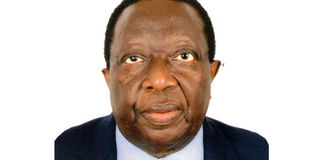Reflections on loans from China Africa

Mr Naggaga is an economist, administrator and retired ambassador.
What you need to know:
- A communist country has outsmarted the biggest capitalist countries and beaten them at their own game.
- It is not China that took away American jobs, as President Trump says, it is America which ‘donated’ jobs to China by ‘overpricing’ American labour.
- With the possible exception of Ethiopia, there has been little effort to get Africans involved right from the start of the projects to ensure a smooth handover.
US Secretary of State (now former) Rex Tillerson, while on visit to Ethiopia recently, warned Africa of some pitfalls in borrowing from China. While loans from China may be a good thing, he said, African countries must ensure that they do not surrender their sovereignty to the Chinese. Over the last two decades, China has flexed its muscles in Africa and become the place to go for African leaders for a quick loan fix, without too many questions asked. Out of an estimated $8 trillion China has loaned out globally, nearly $6 trillion has gone to Africa. But these loans come ‘loaded’ and Rex Tillerson’s advice should be taken seriously.
China has come a long way since the pragmatic Deng Xiaoping assumed leadership of country following the death of Mao Zadong in 1978. Until his retirement in 1989, Deng Xiaoping, led his country through far-reaching market- economy reforms - opening up China to the global economy. It was his vision and pragmatic measures that his successors have built on, transforming China from a third world country to the second largest economy in the world ‘threatening’ the United States, which is still by far the largest economy on the globe.
China is now an industrial giant, manufacturing nearly everything and exporting to all countries; giving traditional industrial superpowers like the US a very hard time indeed. Most of these countries have contributed to China’s fortunes by relocating some of their manufacturing outfits to China to take advantage of the low cost of labour and available expertise. The result has been a Chinese export boom of humongous dimensions and a massive trade surplus. China is literally awash with dollars ready to splash them out on investments across the globe. It has even invested heavily in the United States be it in government securities, shares in prestigious companies, real estate, etc.
A communist country has outsmarted the biggest capitalist countries and beaten them at their own game. It is not China that took away American jobs, as President Trump says, it is America which ‘donated’ jobs to China by ‘overpricing’ American labour. China had another trick up its sleeves ie undervaluing its currency, which gives it an unfair advantage as it is able to sell its products at a lower price on international markets.
An economy built mainly on exports is dicey and China knows this. The United States, for instance, is talking of imposing tariffs on steel and aluminium from China and the rest of the world, creating grounds for a trade war as other countries will impose retaliatory tarrifs on American goods. All the assurances we got in the past that “free trade was good for everyone’’ are threatened, if countries start beating the drums of protectionism. But none of this would be happening if China’s economic profile had not risen far and above what the old traditional global industrial giants had anticipated.
Turning back to Africa, China has again spread its wings across Africa extending trillions of dollars in loans for gigantic infrastructural developments - railways, roads, hydropower dams, oil pipelines, oil refineries, harbours, airports, etc. China does not only provide money, but ensures that the construction of these projects, is done by Chinene companies, using Chinese labour, machinery, etc.
As Secretary Tillerson said, Chinese investments do not create many jobs for the locals. With the possible exception of Ethiopia, there has been little effort to get Africans involved right from the start of the projects to ensure a smooth handover. The Chinese -built projects have also been over-priced because it is all “in-house’’ - the financier, the contractor and supervisor are all one and the same. Since most contracts are often done not too openly, there is no guarantee that China may not have made a provision for it to operate some projects if the governments fail to pay the loans.
The case of Hambantota Port in Sri Lanka is instructive. The Sri Lankan government a few weeks ago formally handed over this strategic port on a 99 -year lease to China to run and recover Sri Lanka’s massive debt to China. This has been heavily criticised by most Sri Lankans as “threatening the country’s sovereignty”. There may be similar cases soon in Africa as grandiose projects plunge the continent into colossal indebtness.
Mr Naggaga is an economist, administrator and retired ambassador.
[email protected].




